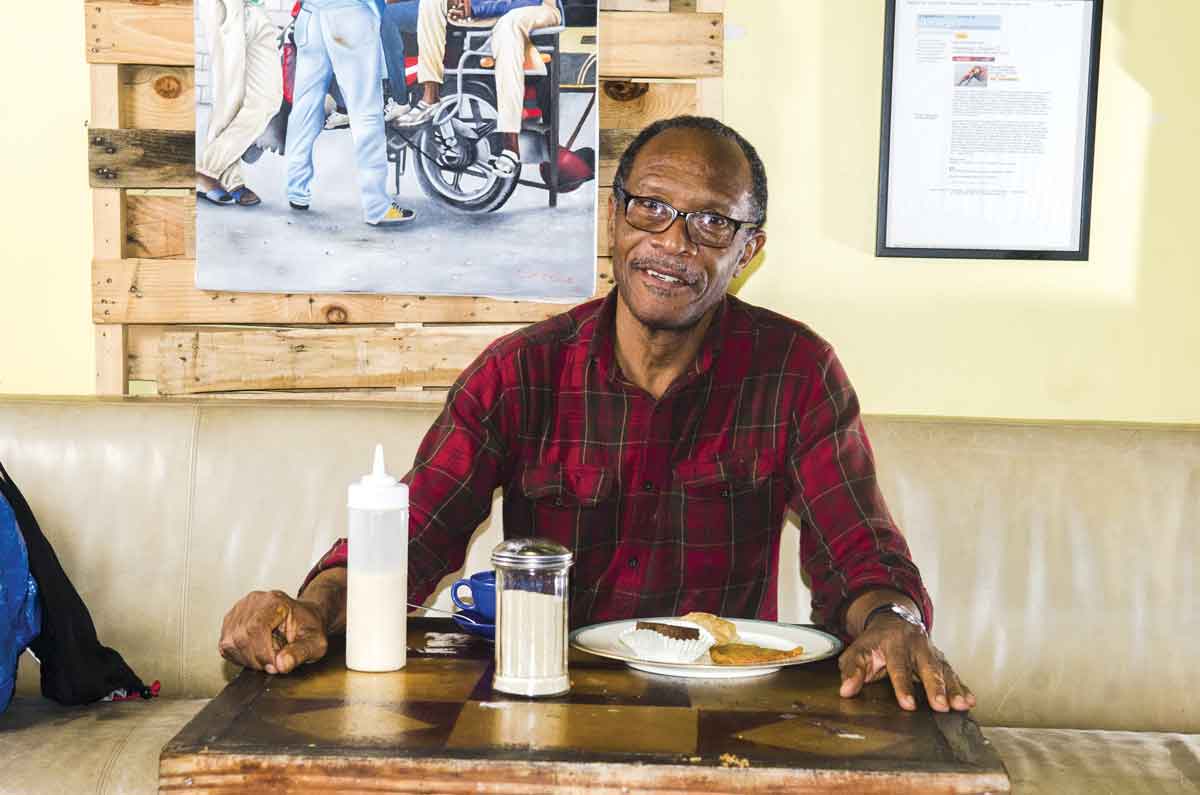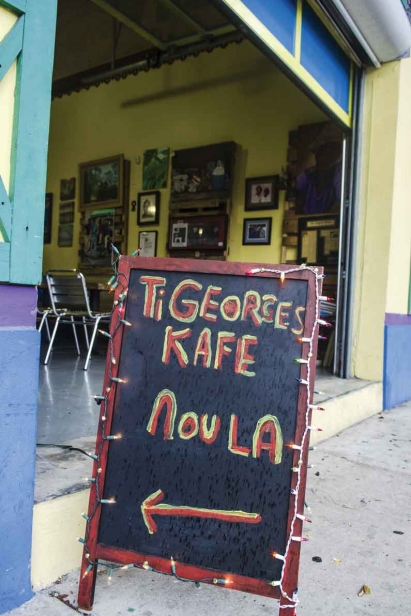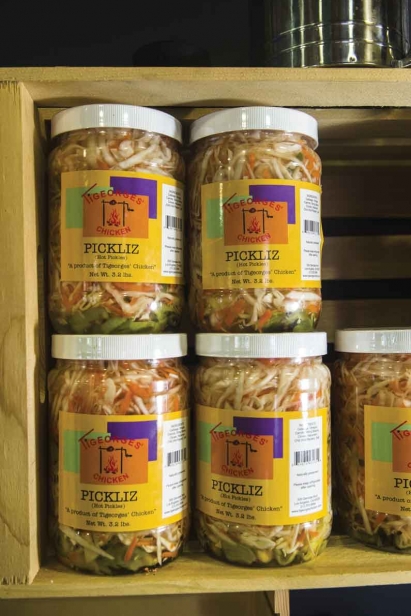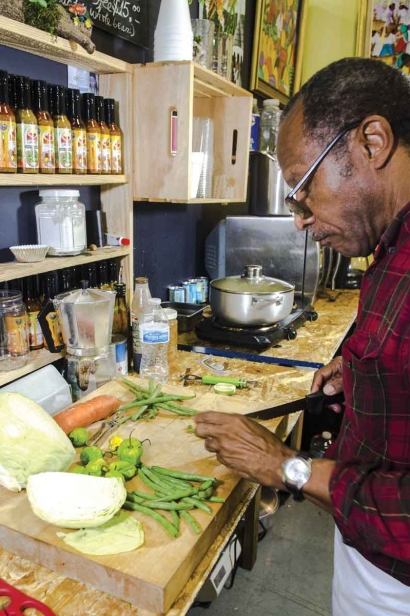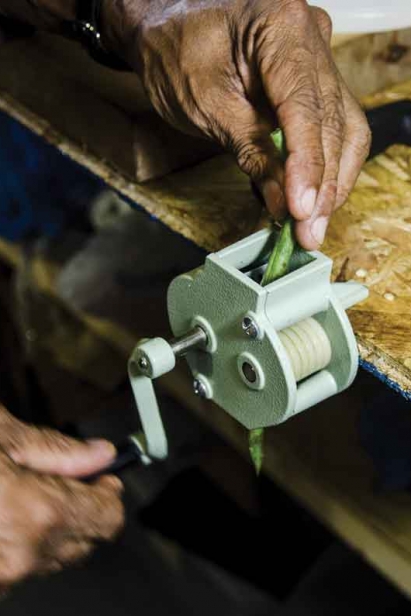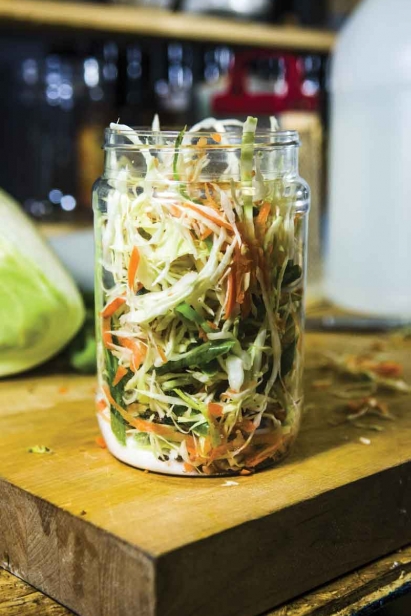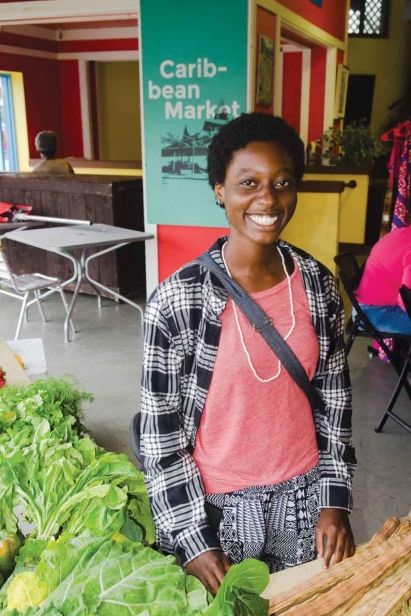Tigeorges Kafe: What Haiti Tastes Like
Note: Tigeorges Kafe closed during the pandemic.
Although he’s spent most of his 65 years living outside of Haiti, George Laguerre hasn’t forgotten the flavors of his Caribbean homeland. He’s been sharing them across the U.S. and is now in Miami.
Lanky and easy-going, Laguerre tends to customers in Tigeorges Kafe in the southwest corner of Little Haiti’s Caribbean Marketplace, a cheerful hub for vendors, artists, musicians and the community at large. On Saturdays – market days – and during special events, the colorful building is alive with music, art and food.
On a regular weekday, his cozy cafe is an oasis for locals and visitors to linger over a cup of Haitian coffee and a pastry, perhaps acra, a crunchy fritter made from taro. Sometimes there’s a board game going on. On the walls are Haitian art and framed newspaper stories about Laguerre’s Los Angeles restaurant, Tigeorges Chicken, where he was hailed as the city’s most famous Haitian.
An American Story
How Laguerre ended up here, in the state with the largest Haitian community in the U.S., starts with a classic American tale involving a road trip, cheap wheels and an entrepreneurial spirit. Born in Port-de-Paix, Haiti, he is one of 10 siblings. Their mother was a nurse, and father an agronomist and writer. Their grandmother, Suzanne, ruled the roost, Laguerre says. “She gave us discipline with love and affection. She wanted all of us to be able to whip up a dish. Everyone was good in the kitchen.” She had a one-day Sunday restaurant, serving squash soup and pikliz, her specialty. Education was also essential – all 10 went to college.
In 1970, Laguerre, six of his siblings and his mother moved to Brooklyn. He went to high school and college, earning a degree at the School of Visual Arts. After graduation, “I had to see America,” he says. He got a beige Renault Le Car and headed cross-country to Los Angeles, picking up a hitchhiker along the way and nearly getting rear-ended in the Grand Canyon. Finally in LA, he tried unsuccessfully to get work in filmmaking in Hollywood and ended up taking a job at Church’s Chicken, which planted a seed for his own place in the future. “I learned about chicken, discipline and food handling,” he says.
Making It
But a career detour was in the works. He took a job with a party rental company, learned enough to start his own business, which he ran for 25 years, getting married and having two sons, Benjamin and Michael, along the way. It was lucrative, but took its toll. “It’s a young man’s job – loading, late hours, parties,” he says. Laguerre was planning his own restaurant and had already started buying equipment, including the rotisserie he would use for his chicken.
He found space in the Echo Park/Westlake Village neighborhood and started small – five tables and four chairs – going to Ikea periodically to pick up a few more chairs until he had 48. Tigeorges’ Chicken’s menu showcased chicken spit-grilled over an avocado wood-burning fire after being marinated in habanero pepper, key lime juice, parsley, salt and black pepper. He served goat, conch, red snapper, squash soup and ti malis sauce, a fiery condiment made from scotch bonnet and habanero peppers and, of course, pikliz, the tangy cabbage slaw. “Everything had the touch of my grandmother,’ he says.
For 15 years, Tigeorges’ Chicken represented Haiti in Los Angeles, a city of immigrants but relatively few Haitians. After he closed, Laguerre felt the pangs of nostalgia for home, so he headed to the nearest place in this country, Miami, where he had longtime friends. He contacted the Little Haiti Cultural Center about opening a business, and within a few months, learned about an opportunity at the Marketplace.
The cafe is called Tigeorges’ Kafe. Here, he’s not serving his famous chicken, focusing instead on coffee and beverages, snacks and specialties, including pate, sandwiches, pastries and other typical Haitian foods. Locals stop by for familiar foods and conversation, along with tourists looking for an authentic Miami multicultural experience. As the city’s urban core expands, Little Haiti has become a hot destination.
Since opening, Tigeorges’ Kafe has been selling out regularly of his Haitian menu items and products, like Lakay manba, a spicy peanut butter, and Haitian coffee. “It’s been good,” says Laguerre. “I want to buy what’s good about Haiti. And I want to give a welcome, make people feel at home.”
Pikliz on Every Table
Every Haitian table features pikliz (PICK-leez), a spicy, vinegary slaw of cabbage and hot peppers. Like Salvadorean curtido, pikliz is a hot, tangy bite that cuts through rich griot and fried pork chunks, and brightens plantains and rice dishes. Tigeorges’ Kafe sells jars of pikliz Laguerre makes according to his own recipe. First, he slices fresh cabbage in thin slices and grates fresh carrot. Some versions of pikliz call for green bell pepper, but Laguerre’s version uses green beans, trimmed and slivered lengthwise using a manual device called a frencher. He adds hot peppers, a few cloves, salt and pepper and fills the jar with vinegar. Tigeorges’ Kafe carries other Haitian products like grapefruit jam; coffee, organically grown in the mountainous northwest region of Haiti; and manba, spicy peanut butter often eaten on cassava bread. Laguerre sells coffee online.
TIGEORGES' KAFE
Caribbean Marketplace
5925 NE 2 Ave., Little Haiti
Little Haiti Cultural Center Complex & Caribbean Marketplace
You can’t miss the colorful centerpiece of the vibrant Little Haiti commercial district, and you might spot the vividly painted tap-tap tour bus parked in front. The center includes an art gallery showcasing Haitian art, sculpture and crafts; a 270-seat theater with classes and performances; and the Caribbean Marketplace – Mache Ayisyen – a colorful building with stalls for food, art and drinks and the hub for the community cultural scene – now designated with a historic marker. Saturdays are market days, where food, farmers, artisan and art vendors set out their wares.
The venue hosts various cultural and food and drink events throughout the year, including Sounds of Little Haiti every third Friday night, and special activities during Haitian Heritage Month in May. Tap Tap Tours offers two-hour bus tours of Little Haiti on Saturdays. HistoryMiami and Miami Culinary Tours also feature Little Haiti tours throughout the year. Visit their website.


